| CATEGORY: | Private Sector |
| CSA PROJECT: | Climate Smart Agriculture |
| SCALE: | County coordination actions |
| LOCATION: | Nyeri, Embu, Laikipia, Nakuru, Vihiga, Kiambu and Muranga |
| PERIOD OF THE PROJECT: | 2019-present |
| GRANT SIZE OF THE PROJECT: | N/A |
KAPRI INSURANCE AGENCY LIMITED

SUMMARY OF ACTIONS
KAPRI has begun a combination of physical and digital (phydigital) training model. The model includes developing demo farms, training farmers in groups, developing systematic videos highlighting CSA technologies and using interactive voice response (IVR) messages to train on financial literacy, insurance and collective bargaining. The phydigital model is innovative as it initiates farmers’ access to extension and continuously phases out the in-person aspect of training which is costly in climate smart agriculture information dissemination.
CONTEXT
Productivity in the agricultural sector is low because of several challenges such as poor access to credit, land degradation, poor access to agricultural inputs, crop livestock diseases and climate hazards. The most significant climate challenges in the counties are drought, extreme temperatures, frost and floods. Overall, the social, institutional and geographical context of farmers’, limit their capacity to cope and adapt to these changing climatic conditions.
OBJECTIVE
The objective of the project is to scale CSA through Physical and Digital (PhyDigital) extension models and insurance solutions.
KEY INTERVENTIONS
| FARM LEVEL | TARGET(NO OF FARMERS) | INDICATORS MONITORED |
| Promotion of drought tolerant crops | 100,000 households | agricultural productivity |
| CSA based access to markets and value chains | 100,000 households | income |
PARTICIPATION IN KEY CLIMATE & AGRICULTURE NETWORKS
The organisation is a member of the Climate Smart Agriculture Multi Stakeholder Platform.
INVOLVEMENT IN CSA
RELEVANCE OF CSA MSP TO WORK
• Knowledge dissemination
• Technology transfer
• Coordination and networking
- Information about CSA
- Networking
- Learning and exchange
- Reporting and showcasing
- Developing new business
- Influencing policy environment
- Introduction of Insurance in the CSA space for a risk mitigation
RECOMMENDATION ON WAYS TO SUPPORT MSP
- Dissemination of climate smart agriculture knowledge and technologies
- Capacity building of key actors involved in climate smart agriculture implementation
- Coordination of CSA actions.
LESSONS AND CHALLENGES IN IMPLEMENTATION OF CSA PROJECT
In 2017, KAPRI was selected to provide farmer insurance in four counties that have since been increased to seven counties in 2019. In the three years of the KAIP program, there has been an increase of smallholder farmers accessing insurance from –zero to 3,700. There are challenges in coordination of the different service providers. Pricing of the insurance by the Government is done annually but at times is not on time, extension services that should start before the planting season are sometimes delayed; insurance education needs to be bundled with training on good agricultural practices. The implementation of the program is yet to achieve its potential, because it lacks a central coordinator to ensure that all facets are timely, effective and efficient.
